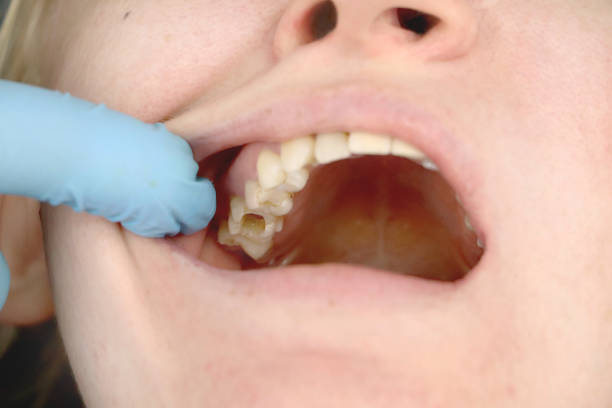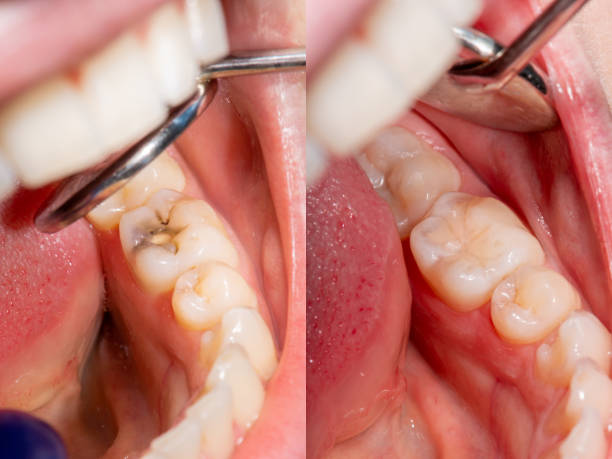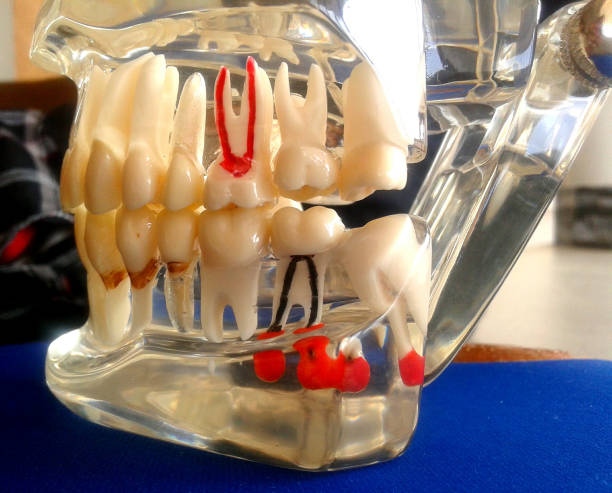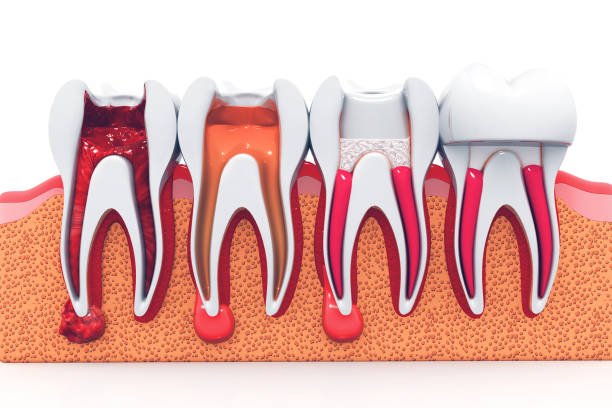
At Baroda Dental Clinic of Vadodara, our experienced dental unit offers painless root canal treatment for patients with infected and damaged teeth. If you have determined tooth pain or a lingering cold feeling after eating or drinking, it may be time to come in and visit our expert
We will quickly decide whether you need a root canal, and give you all the information you would like. Our expert team has been performing endodontics root canal therapy for patients of all ages for over 15 years. We’ll work keenly to make your procedure fast, pain-free, and successful. Read more to learn about our root canal therapy, and give our office a call at 90 818 55855 or 0265 2353500 to set up an appointment today!

Signs and symptoms
- Chipped Or Cracked Tooth
- Gum Area Is Increased
- Dark Stain Of The Tooth
- Very Hard Decay
- Critical toothache pain.
- Sensation to hot and cold.
- A boil on the gums.
Complete guide of root canal
If a tooth is infected, Root canals can save a tooth. RCT also keep a tooth from being hypersensitive. In that case, We should drill tooth to remove deep cavity for placing the crown.

Root canal treatment will thoroughly remove the nerve, and blood supply, and the conditions filled with a material called gutta-percha. With the root canal, the roots are numbed to allow the dentist to get rid of the affected nerve, remove any infection, and save the tooth. If your tooth is not infected, the root canal treatment may take a single day visit. However, if there is an active infection, the root canal, is usually completed in two visits. The second visit is necessary to remove the active disease.

The tooth can be sealed up first before bacteria deal with nerve, before that we should remove the pulp and infected nerve tissues. And then, the dentist applies antibiotics to tooth canals.
The dentist will give the prescription of oral antibiotics for a week. Taking regular medicines, the patient needs to return to the root canal can be finished, and a post and crown made.
Tips for Care After Root Canal Treatment
When you experience excruciating pain and discomfort on your teeth, you may wonder if you need root canal treatment. This procedure is commonly known as endodontics therapy.

The dentist recommends treatment when the nerve is infected and inflamed. The cause is tooth decay or if the tooth is cracked, broken, or injured. During treatment, the dental expert will seek a way of removing the infected pulp. Thus, the dentist will drill a hole in the tooth.
The tunnel will enable the dentist to remove the pulp and clean the canal area. After removing the pulp and cleaning, dentists fill or seal the gap with cement. Sealing the hole prevents further damage. A visit to an endodontist or dentist is vital in determining whether you need the procedure. The root canal process can completely cure your problem.
Symptoms of root infection
According to dentists, tooth pain is the most common symptom of root infection. The pain can be mild or severe. That depends on the level of disease. The pain can increase during the day or when biting using the tooth. Some patients with root infection might be experiencing tooth sensitivity to hot or cold liquids and foods.

The gums can show symptoms of root canal infection too. The gums will become tender and swollen near the infected area. If you experience any of these symptoms, place an ice pack on the jaw. That will assist in reducing the pain. You should then contact or visit a dentist at the earliest opportunity. The dentists have the skills and equipment to prove the symptoms of root infection.
Diagnosis before treatment
The treatment process begins with a proper examination of the tooth. Hence, X-Ray will diagnose the problem, Whereas, the X-Ray images will show the decay. After examining the teeth, the dental expert will reveal to you the best treatment options.


If the infection is complex or widespread, the dentist will refer you to an endodontist. The endodontist is a specialist that treats nerve damage. The specialist will determine whether the root canal procedure will be necessary or if you can go for a less invasive treatment alternative.
Tips for care after treatment

After the treatment, the tooth is likely to last for a long time. However, that is only possible with good tooth care. The success rate of the procedure is very high. Listed below are ways of caring for the tooth after treatment.
· Practice good oral hygiene – Floss your teeth every day and brush them twice in a day. It will prevent future dental infections.
· Visiting the dentists regularly – This will grant you access to expert teeth cleaning.
· Avoid chewing hard foods – Chewing hard and cold foods can lead to a breaking of teeth.
What is root canal?

Root Canal treatment treats the inside of the tooth. Surgery is necessary when the pulp becomes swollen or infected. It depends on a variety of causes: deep decay, repeated dental procedures on the tooth, faulty crowns, or a crack or chip in the tooth. Besides, injury to a tooth may cause pulp damage even if the tooth has no visible chips or cracks. If pulp inflammation or infection is left untreated, it can cause pain or lead to an abscess.
What is the sign of root canal?
The signs of root disease can seldom be straightforward to spot and a little confusing at other times. You do not want the signs to be too visible, because if they are, you likely have a sore. Sometimes, It is a painful condition, and it only occurs if a dental problem has been allowed to decline.
Is it an expensive treatment?
It is not an expensive treatment. The cost of a root canal method depends only on the rates offered at your local surgery. Several dentists charge more than required and others who charge less; there is no set price for dental treatments. For comparison’s sake, a root canal is usually more expensive than a filling, but it is cheaper than extraction and a dental bridge.
Is there an alternative?
You could have the entire tooth extracted, but it’s even better to try to save it. Mainly since root canal treatment is routine and has a very high success rate (over 90%). Saving the tooth can stop other troubles from occurring later on. It could include bite problems from teeth shifting position, difficulty eating, and loss of jawbone volume and density.
Does root canal treatment painful?
The procedure usually causes no more pain than a center would. Root canal therapy may have a bad reputation, but it is undeserved; in this case, it’s the disease that’s to charge and not the cure. Root canal treatment relieves the pain!
How do I know when I need a root canal?
Many peoples may feel tooth pain at starting, and then it goes away on its own or with the help of medicines. Just because it has stopped hurting doesn’t indicate it is no longer infected. Root canal treatment is designed to clean the inside of the tooth (the source of infection) and stop the extent of disease.
Some peoples may never feel pain with an infected tooth. We can find root canal signs through routine x-rays and clinical research. The tooth may have a persistent infection that the body has accommodated enough not to have gone beyond the patient’s pain threshold.
Before doing any root canal, the endodontist will examine all X-Rays and clinical data to determine if a root canal should perform or not.
What is the duration of treatment?
In just 30-40 minutes, a dentist can numb your tooth, clean it mostly out and fill it so that it looks good on an x-ray. You can urge your dentist to finish your root canal treatment by a specific time, but that may mean that the dentist has to cut corners to fit your request. It isn’t helpful to pressure your dentist to finish your root canal ASAP
